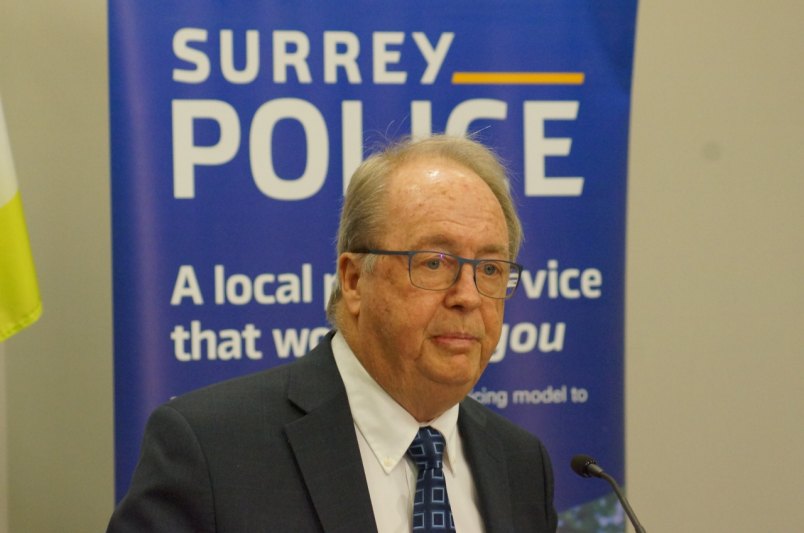The City of Surrey has spent $5.4 million in the first quarter of 2020 on a police force transition that now has mounting questions as a result of the COVID-19 pandemic economic response.
Surrey mayor Doug McCallum has previously stated the transition is ongoing and will remain so to meet the anticipated April 2021 launch of the Surrey Police Department.
McCallum has said as many as six in 10 RCMP officers will move to SPD. His estimate is disputed by Brian Sauve, president of the National Police Federation, who is now raising even more questions about officer recruitment amid the pandemic.
Sauve notes the Justice Institute of B.C. has shut down and so it’s unclear how Surrey will reach its target of about 800 police officers, plus administration staff for the new force.
“Recruiting for a new Surrey police force is going to be a challenge,” said Sauve.
“The mayor’s comments that 60% (of Surrey RCMP officers) are going to stay is inflated and inaccurate and who knows where that’s coming from,” said Sauve.
“There is very little interest to become a Surrey PD cop,” he added.
Sauve guessed if SPD were able to extract even half its force from neighbouring municipalities, the Justice Institute still maxes out at only roughly 200 recruits per year, notwithstanding any impact COVID-19 will have on those numbers. JIBC did not respond to Glacier Media for comment on its own COVID-19 impact.
Then come financial considerations of the transition during the pandemic.
The SPD transition is considered the most expensive capital project on the books for the next two years, totalling $45 million. Then Surrey will need to pay more in operating costs over its five-year financial forecast. Coun. Linda Annis notes the total cost over five years is $129 million, although McCallum has retorted that much of the increased operating costs for a municipal force will be a moot point with the anticipated unionization of the RCMP force and an expected pay increase to match municipal officers.
Annis is one of four councillors who initially supported the transition in November 2018 but now oppose it, citing a lack of transparency from McCallum and costs.
On Monday night, Coun. Stephen Pettigrew expressed his concerns at a virtual council meeting.
“I am still extremely concerned about the financial position of the city and the direction we are taking especially in light of COVID-19. I feel that we need to listen more to our business community and to the citizens of the city to and reallocate the transitional costs to shore up the budget.”
And on April 8, Coun. Brenda Locke asked for council to have all non-essential city project work be paused until there is a better understanding of the fiscal implications of the COVID-19 pandemic.
“This includes, but is not limited to, the police transition,” said Locke in a proposed notice of motion.
“I won’t allow that…” replied McCallum, “because we’re already dealing with it. First of all, we have our police force; we have a budget for it that’s been approved by council, a unanimous motion by council for our own police force.”
McCallum maintains Surrey is the largest city in Canada without its own force (nearly twice the size as the second largest city, Burnaby). A local force would allow for greater control by city hall, McCallum contends.
Surrey announced Wednesday it is estimating a budget shortfall of up to $42 million to year-end as a result of the pandemic response.
Last month the province allowed cities the ability to borrow from their reserve funds. But should the pandemic eat away at the operating budget in 2021 that allowance may be of little comfort to Surrey residents, who could face service cuts from city hall or cuts to other capital works projects, if not the police transition.
That’s because Surrey has among the lowest reserves compared to its operating budget.
Surrey recorded total expenses of $788 million in 2018, according to its most recent consolidated financial statement. �鶹��ýӳ��recorded about double that with $1.6 billion in expenses.
Yet, Surrey has just $82 million in reserves, whereas �鶹��ýӳ��has $1.28 billion, for example.
On Monday the National Police Federation (NPF) released a poll it commissioned from Pollara Strategic Insights, that claimed 83% of 803 Surrey residents contend a municipal police force is not a major priority and 90% believe “mayor and council should take a step back to evaluate spending plans to focus on residents’ most urgent priorities.”
The poll suggests support for the mayor’s plan dropped from 48% in January to 31% in this April survey, while opposition increased from 46% to 60% during the same period.



